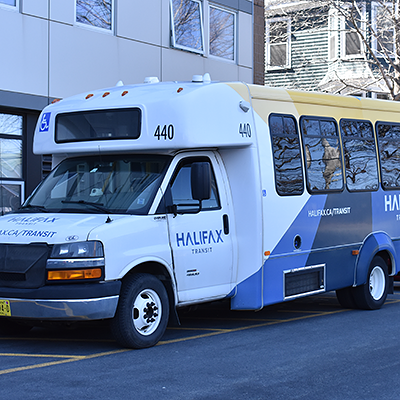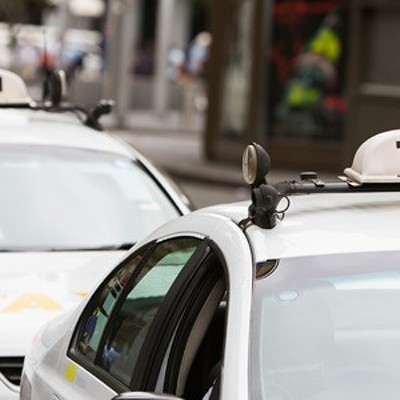Andrew Cochran and I are sitting in a Halifax coffee shop. He’s moving my Olympus mini-recorder and his bottle of Dasani water around the table top—sort of like play ships sailing on a play harbour—to explain some otherwise inexplicable concept of intellectual property law. He’s already told me a recent study by the Law Commission of Canada has described intellectual property—which has to do with copyright, trademarks and patents—as an area of law that’s “rife with uncertainty.”
Which is one reason it fascinates Cochran. But only one.
Three years ago, at the age of 51 and with less than a year’s worth of 30-year-old university credits on his academic resume, Cochran virtually invented a master’s degree program for himself—combining courses in law, business management and computer science with research into how to value, protect and transfer intellectual property. His eye-glazingly titled thesis— Valuation and Verification of Intellectual Property as the Principal Financial Asset in a Secured Interest Transaction—earned him a Master’s in Electronic Commerce from Dalhousie University in 2005. These days, he divides his time among teaching, helping an American mergers and acquisitions firm navigate the tricky shoals of valuing intellectual property-based companies and trying to decide his own next career. The choice seems to be between going for his PhD or writing a mass-market book about the lessons to be learned from failing in business.
Which is the other reason why intellectual property fascinates Cochran.
In his last life, Cochran created from the whole cloth of his imagination a hugely successful pre-school television series called Theodore Tugboat—an intellectual property—which not only continues to be broadcast around the world but which has also spawned a flock of licensed Theodore products: books, videos, toys, jigsaw puzzles, games, even “environmentally responsible” Theodore-themed clothing. Not to forget Theodore Too, the smiling, red ball-capped, eyeball-moving, full-sized version of the show’s signature tugboat. During the summer tourist season, Theodore Too takes his pre-school fans and their families on tours of the Big Harbour from his home dock at Murphy’s on the Water.
The problem for Cochran is that he no longer owns the rights to Theodore Tugboat or any of its spinoffs. Partly because, as Cochran put it in his thesis, “it remains easier to finance a building than the idea inside,” Theodore’s very success became the jagged rock on which Cochran Entertainment foundered. In 2002, the company was pushed into receivership and Andrew Cochran declared personal bankruptcy.
<@HSG intro bold>The true tale of the rise and fall of Theodore Tugboat begins on the Halifax waterfront in 1989. Cochran, a former TV journalist who’d run Canada AM and CTV National News before moving home to Halifax to create a successful CBC children’s series called Blizzard Island, was walking along the waterfront one day when he noticed a container ship and two tugs in the harbour. Their wheelhouses were positioned as if they were having a conversation. Cochran transformed that vignette into an ever-expanding series of bedtime stories for his two-year-old son William; the stories evolved into the idea for a children’s television series.
After more than two years in development, CBC gave Cochran the green light for 20 episodes. And then another 20, and another 20.
Partly because the show was easily customizable—the only human character in each 15-minute episode was ex-Mamas and Papas singer Denny Doherty, the Harbour Master who told stories in voice-over, meaning producers in other countries could easily substitute local narrators—broadcasters around the world also scooped up the series. In 1996, in what seemed at the time like a major coup, PBS, “the premier children’s broadcaster in the world,” bought the rights to broadcast Theodore Tugboat in the United States.
Within days after it began airing on PBS, however, the calls began flooding into Cochran’s Halifax offices from American parents. “They’d say, ‘Here’s my credit card number, here’s my FedEx number, send me everything you have.’ And we’d have to say, ‘But we don’t have anything.’ And they’d get angry.”
Which is how, on a June morning in 1998, Andrew Cochran found himself staring out the window of New York’s Javits Convention Center and realizing—not for the last time—he wasn’t splashing in the Big Harbour anymore. It was the first day of the entertainment industry’s biggest annual licensing trade show, an event where sought-after brand names from the NFL to Star Wars do deals with companies that want to license their images for everything from action figures to school lunch boxes.
Cochran was quietly confident; he’d already done a few direct deals in advance of the show, licensing Random House to produce Theodore books and Brio to create die-cast wooden toys. But the New York show was to be Theodore’s coming-out party. Cochran even had a lighthouse-themed booth specially built—its beacon could be seen all over the convention floor—and stocked it with salt water taffy, Theodore screen savers and fridge magnets.
Cochran had his first second thoughts a few minutes after the show opened when the first visitors to his booth arrived carrying expensive brocade—not plastic or canvas—bags from a nearby Teletubbies booth. Teletubbies, a wildly popular British kids show, had just debuted on American television. Later that morning, during a break, Cochran wandered down the hall and smacked into a floor-to-ceiling Teletubbies billboard. “Then, as I was going up the stairs, I looked out the window and I saw that every bus in New York had Teletubbies plastered all over it.”
The month before, it turned out, American media giant Handleman Company, an entertainment products distributor with one billion dollars in annual sales and store-shelf tentacles into more than 22,000 big retailers, had spent $100 million to acquire the company that brought Teletubbies to the US. A few weeks later, it invested another million just to promote the pre-school program at the three-day licensing show.
Cochran shrugs. “Those were the economics we were trying to compete with.”
They couldn’t.
Part of the problem was that children’s television programs had become loss leaders, infomercials for merchandise sales that helped offset production costs. But getting merchandise on store shelves was prohibitively expensive. FAO Schwartz, the legendary American toy retailer, for example, offered to stock Theodore merchandise—for an upfront fee of $75,000-per-store.
To complicate matters, most conventional financiers still couldn’t figure out how to deal with the reality the most important assets of companies like Cochran’s were intangible.
Cochran tried various ways to finance the expansion he knew was critical. He created another family series, Pit Pony, which was supposed to generate profits to reinvest in Theodore, but it turned into a cash drain when a co-production deal with a German company fell through. He tried to attract Canadian venture capitalists. “The reaction was initially positive,” he says, “but then the CINAR scandal”—the Montreal-based animation company faked information to get funding—“blew up and, suddenly, no one wanted to touch entertainment companies.” Cochran was even willing to sell off most or all of his company to get cash. He shipped off a sales presentation to potential international investors over the 2001 Labour Day weekend. It seemed to be working. “We were getting calls from substantial companies in the US and Europe, some of whom would have made spectacular partners.” He pauses. “And then, ‘Boom!’ September 11. Business stopped. No one was flying, no one was investing.”
By the time serious discussions could start again, he says, it was over.
Does it upset him to look out on the harbour now and see Theodore Too full of cash-paying, souvenir-buying tourists, knowing he no longer benefits from the intellectual property he created and nurtured? (When Cochran’s company went into receivership, the receiver sold the rights to Theodore to Classic Media, an American production and distribution company that also holds the rights to such iconic kids’ characters as the Lone Ranger, Lassie and Rocky and Bullwinkle. Murphy’s on the Water operates Theodore Too under an arrangement with Classic Media.)
I don’t actually ask Cochran how he feels about all this, but he answers anyway. There’s no good answer, he says. “I don’t want to make it seem like, ‘poor me, I’m the only person who suffered from this.’” There were plenty of “excellent, creative people” at Cochran Entertainment whose dreams also sunk with the company’s collapse. At the same time, he doesn’t want to minimize what happened. “I don’t want to appear cavalier about it.”
But, four years later, there is also what he calls “a need to move on.” Theodore Tugboat was his school-of-nasty-knocks learning experience and the master’s program a chance to assimilate that and figure out how to apply it to helps others in a world where a company’s most important asset is most often its intellectual property.
“So let’s say this”—he points to my recorder—“is a book and along comes Dasani Productions, and it wants to buy the book, but it can’t buy the book, it can only buy the rights to it, or some rights …”
We’re definitely not in the Big Harbour anymore.















